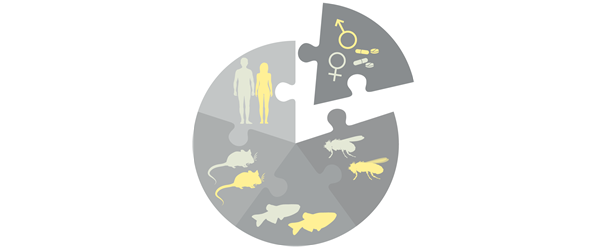Issues
-
Cover image
Cover Image

Deletion of Snrpb in mouse neural crest cells models craniofacial defects found in cerebrocostomandibular syndrome. Sagittal view of an E17.5 mouse wild-type embryo. Normal development of craniofacial bones (red) and cartilage (blue) are seen. Alam et al. (dmm049544) show that in mutant embryos with mutation of Snrpb in the neural crest cells, craniofacial bones are reduced, the jaw is malformed, and the hyoid and tracheal cartilage are missing. Cover image is licensed under a Creative Commons Attribution 4.0 International license.
- PDF Icon PDF LinkTable of contents
- PDF Icon PDF LinkIssue info
EDITOR'S CHOICE
EDITORIAL
Genetic variance in human disease – modelling the future of genomic medicine
Summary: DMM is launching a new Subject Focus on genetic variance in human disease. Here, we discuss this ongoing series of invited articles and reflect on advances in understanding the genotype–phenotype complexities in disease.
A MODEL FOR LIFE
PERSPECTIVE
ALDH2 variance in disease and populations
Summary: The alcohol flushing-associated ALDH2*2 variant is one of the most common genetic polymorphisms in humans. This variant exhibits complex pleiotropic effects associated with alcohol consumption and aldehyde toxicity, which diversely impact human health.
REVIEWS
Interpreting protein variant effects with computational predictors and deep mutational scanning
Summary: Variant effect predictors (VEPs) are algorithms that aim to predict the likelihood that a genetic or protein variant will be pathogenic. Herein, we review benchmarking procedures and deep mutational scanning as methods for validating VEPs.
Humanized yeast to model human biology, disease and evolution
Summary: The functionally replaced human genes in yeast generate humanized yeast, providing a simple growth-based readout for the functions of hundreds of critical human genes and allowing researchers to study them in a simplified organismal context.
Deep phenotyping for precision medicine in Parkinson's disease
Summary: This Review discusses challenges in neurodegenerative disease research and how deep phenotyping and genomics, alongside machine learning, can help the progress towards precision medicine.
RESEARCH ARTICLES
Hsp40 overexpression in pacemaker neurons delays circadian dysfunction in a Drosophila model of Huntington's disease
Summary: This study shows, for the first time, a neuroprotective role of chaperone Hsp40 in suppressing circadian dysfunction associated with Huntington's disease in a Drosophila model.
Limitations of mouse models for sickle cell disease conferred by their human globin transgene configurations
Editor's choice: This study describes the genomic structures of two common sickle cell disease mouse models, illustrates their limitations for analyzing some genetic therapies and confirms the importance of distal DNA elements in human globin gene regulation.
Monitoring of inflammation using novel biosensor mouse model reveals tissue- and sex-specific responses to Western diet
Summary: We used a caspase-1 reporter mouse model to measure spatiotemporal dynamics of inflammation in obese mice, identifying tissue- and sex-specific caspase-1 activation patterns and inflammatory phenotypes, indicating mechanisms underlying the dynamics of inflammation.
Identification of two cancer stem cell-like populations in triple-negative breast cancer xenografts
Summary: We identified two types of cancer stem cell (CSC)-like populations in triple-negative breast cancer xenografts and patients. These CSC-like populations could potentially make tumors more drug resistant and thus more difficult to treat.
Snrpb is required in murine neural crest cells for proper splicing and craniofacial morphogenesis
Summary: We report the first mouse model for cerebrocostomandibular syndrome, showing that mis-splicing of transcripts that regulate P53 activity and craniofacial-specific genes contributes to craniofacial malformations.
Loss of slc39a14 causes simultaneous manganese hypersensitivity and deficiency in zebrafish
Summary: Transcriptome analysis of zebrafish slc39a14−/− mutants demonstrates that loss of slc39a14 leads to concurrent manganese neurotoxicity and deficiency, both of which are associated with Ca2+ dyshomeostasis.
An enriched environment re-establishes metabolic homeostasis by reducing obesity-induced inflammation
Summary: A series of physiological, histochemical and molecular analyses reveal that enriched environment decreases inflammation in adipose tissue and in hypothalamus, re-establishing glucose metabolism in metabolically compromised mice.
The role of Lrp6-mediated Wnt/β-catenin signaling in the development and intervention of spinal neural tube defects in mice
Summary: Conditional ablation of Lrp6 in dorsal neural folds causes spinal neural tube defects that can be rescued by genetic activation of β-catenin or maternal supplementation of Wnt signaling agonists.
Modulation of autoimmune diabetes by N-ethyl-N-nitrosourea- induced mutations in non-obese diabetic mice
Summary: Automated meiotic mapping, which allows rapid discovery of induced germline disease modifier mutations, reveals influential loci in mice with an autoimmune diabetes phenotype, identifying genes that may influence type 1 diabetes susceptibility in humans.
AMP-activated protein kinase promotes breast cancer stemness and drug resistance
Summary: AMPK inhibition in conjunction with regular chemotherapy is likely to reduce the stem cell pool and improve chemosensitivity and therapeutic outcomes in breast cancers.
The GBA1 D409V mutation exacerbates synuclein pathology to differing extents in two alpha-synuclein models
Summary: Phenotyping data for two novel mouse models combining glucocerebrosidase (GCase) deficiencies and alpha-synuclein pathology reveal the extent to which alpha-synuclein pathology is exacerbated by GCase deficiency.
Ppp4r3a deficiency leads to depression-like behaviors in mice by modulating the synthesis of synaptic proteins
Summary: Chronic unpredictable mild stress, a putative model of depression, reduced PPP4R3A expression in mice. PPP4R3A deficiency in mice leads to depression-like behaviors by inhibiting mTORC1-mediated synthesis of synaptic proteins.
FIRST PERSON
Sex matters in preclinical research

DMM calls for improved inclusion, analysis and reporting of sex as a biological variable in preclinical animal modelling research. Read the full Editorial by Monica J. Justice.
Subject collection: Building advocacy into research

DMM’s new series - Building advocacy into research - features interviews, ‘The Patient’s Voice’, with patients and advocates for a range of disease types, with the aim of supporting the highest quality research for the benefit of all patients affected by disease.
Travelling Fellowships for early-career researchers

DMM and its sister journals offer Travelling Fellowships of up to £3,000 to graduate students and post-doctoral researchers wishing to make collaborative visits to other laboratories. Find out more about our Travelling Fellowships and read stories from previous grant recipients.
Read & Publish Open Access publishing: what authors say

We have had great feedback from authors who have benefitted from our Read & Publish agreement with their institution and have been able to publish Open Access with us without paying an APC. Read what they had to say.
The Forest of Biologists
Our Publisher Claire Moulton recently visited the two Woodland Trust UK sites where we are planting new native trees for published Research and Review papers and protecting ancient woodland on behalf of our peer reviewers.



